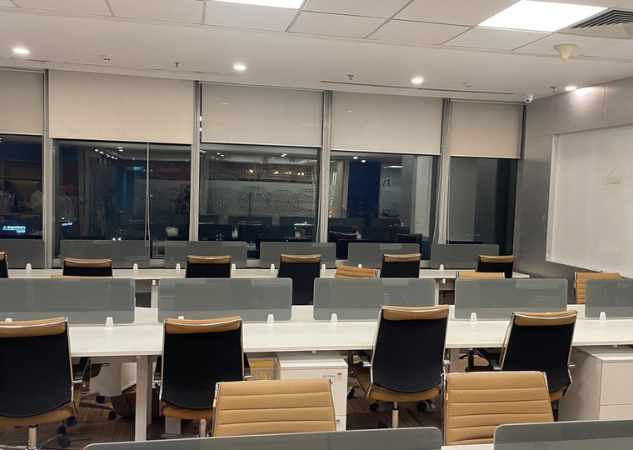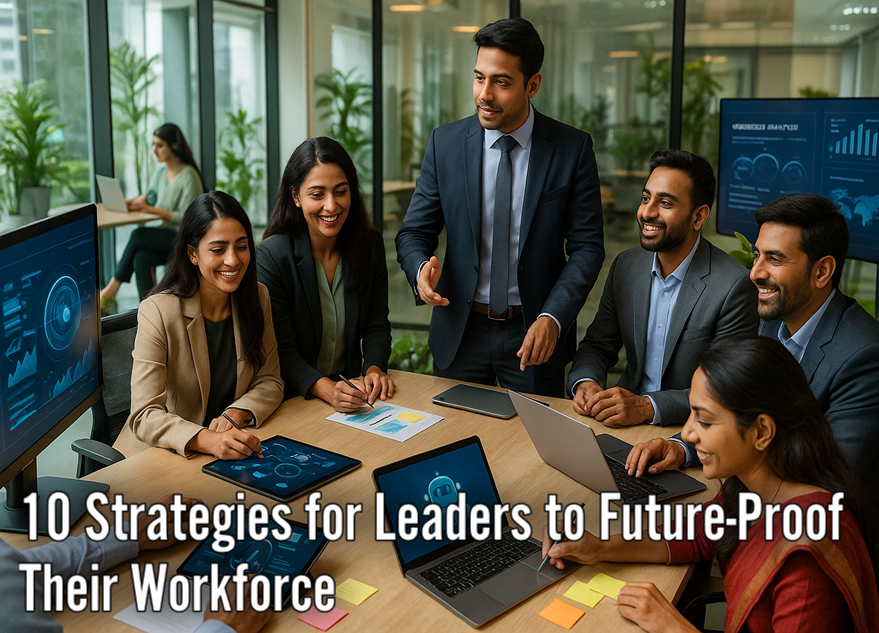The world of work is evolving faster than ever. Rapid technological advancements, changing market dynamics, and unpredictable global events demand that businesses and their workforces stay ahead of the curve. For leaders, this means preparing their teams to not just survive but thrive in an uncertain future. The blog enlists 10 useful strategies to help future-proof your workforce.
💡 Are you looking for Coworking space in Gurgaon, Noida or Delhi? We are just a call away.
Call Now: 08999 828282
10 Useful Strategies for Leaders to Future Proof Their Workforce
- Invest in Continuous Learning
- Embrace Technology and Automation
- Foster Adaptability and Resilience
- Encourage Cross-Functional Collaboration
- Develop Leadership at Every Level
- Focus on Employee Well-Being
- Strengthen Digital Literacy
- Encourage Creative Thinking
- Plan for Succession
- Stay Aligned with Market Trends
1. Invest in Continuous Learning
A workforce that stops learning falls behind. Encourage your employees to upskill and reskill by providing access to online courses, industry certifications, and in-house training programs. Partner with educational platforms or institutions to offer personalized learning paths. When employees grow their knowledge and skills, they bring innovation and efficiency to the workplace.

2. Embrace Technology and Automation
Technology is transforming industries at an unprecedented rate. Help your employees stay ahead by familiarizing them with emerging technologies like AI, automation, and cloud-based tools. Provide hands-on training and show them how these tools can make their work easier and more impactful. A tech-savvy team is a future-ready team.
3. Foster Adaptability and Resilience
The ability to adapt to change and bounce back from setbacks is critical in today’s unpredictable business environment. Conduct workshops on change management and resilience. Share success stories of adaptability within your organization to inspire employees. A resilient workforce can tackle challenges without losing momentum.
Also Read: 10 Ways You Can Use AI to 10x Your Leadership Skills
4. Encourage Cross-Functional Collaboration
When employees collaborate across departments, they gain new perspectives and develop a broader skill set. Create opportunities for cross-functional projects, job rotations, or shadowing programs. This not only enhances problem-solving capabilities but also strengthens teamwork and breaks down organizational silos.
5. Develop Leadership at Every Level
Leadership isn’t just for those at the top. Identify potential leaders in every department and invest in their development through mentoring, coaching, and leadership training. Empower employees to take ownership of their roles and make decisions. When leadership becomes a shared responsibility, the organization becomes more agile and prepared for future challenges.
6. Focus on Employee Well-Being
A healthy and happy workforce is a productive one. Introduce wellness programs that address physical health, mental well-being, and work-life balance. Flexible working hours, access to mental health resources, and initiatives like mindfulness sessions can go a long way in reducing stress and increasing employee engagement.
7. Strengthen Digital Literacy
Digital skills are no longer optional—they are essential. Offer advanced digital training programs that go beyond basic tools. Teach employees how to analyze data, use collaboration platforms effectively, and understand cybersecurity basics. These skills are critical for staying competitive in a tech-driven world.
8. Encourage Creative Thinking
Innovation drives progress, and creativity fuels innovation. Create a work environment where employees feel encouraged to think outside the box and share unconventional ideas. Recognize and reward those who contribute fresh perspectives, and establish brainstorming sessions or hackathons to inspire collective creativity.
💡 SMBs looking for HR, Marketing, Technology and Funding solutions for their business.
Call Hello Jarvis 994 8000 800
9. Plan for Succession
Every organization faces transitions, whether planned or unexpected. Succession planning ensures you’re ready for these moments. Identify high-potential employees and prepare them to step into leadership roles through tailored development plans. A strong succession strategy minimizes disruptions and secures the company’s future.
10. Stay Aligned with Market Trends
The business landscape is constantly evolving. As a leader, it’s your responsibility to monitor market trends and industry shifts. Share these insights with your team and ensure their skills and roles are aligned with the future demands of the industry. Regular workshops or town halls discussing market insights can keep your workforce informed and agile.
Future-proofing your workforce goes beyond overcoming challenges; it’s about unlocking growth opportunities and empowering your team to excel in a rapidly evolving world. By fostering adaptability, encouraging continuous learning, and staying aligned with emerging trends, you can create a resilient, innovative, and future-ready workforce. To complement these efforts, consider The Office Pass (TOP) Coworking Space – a dynamic environment designed to inspire creativity, collaboration, and productivity. Leaders who invest in these strategies and provide access to modern, flexible workspaces like The Office Pass will position their organizations for long-term success. Call us at 08999 828282.
FREQUENTLY ASKED QUESTIONS (FAQS):
Question: What does “future-proofing the workforce” mean?
Answer: Future-proofing the workforce means preparing employees and the organization to adapt to future challenges and changes, such as new technologies, evolving industries, and shifting market demands.
Question: Why is future-proofing important for leaders?
Answer: Future-proofing helps leaders ensure their teams stay relevant, skilled, and competitive in a rapidly changing world. It reduces risks like job redundancies and organizational stagnation.
Question: What role does technology play in future-proofing a workforce?
Answer: Technology is critical as it drives many changes in industries. Leaders must adopt new tools and train employees in emerging technologies to stay ahead of competitors.
Question: How can leaders encourage continuous learning in their teams?
Answer: Leaders can provide access to training programs, offer incentives for skill development, and create a culture where learning and innovation are celebrated.
Question: Should leaders focus on soft skills or technical skills?
Answer: Both are important. Soft skills like communication, adaptability, and leadership are vital for teamwork and problem-solving, while technical skills ensure expertise in specific tasks.
Question: How can leaders identify future workforce challenges?
Answer: Leaders can analyze industry trends, seek employee feedback, monitor advancements in technology, and consult experts to anticipate upcoming challenges.
Question: What role does diversity play in future-proofing the workforce?
Answer: Diversity fosters innovation and creativity. By including varied perspectives, leaders can develop solutions that cater to a wider audience and address more challenges effectively.
Question: How can leaders prepare employees for automation and AI?
Answer: Leaders should train employees to work alongside AI and automation tools, focus on upskilling in areas where human creativity is irreplaceable, and explore new roles created by these technologies.
Question: What steps can leaders take to retain top talent?
Answer: To retain top talent, leaders can offer career growth opportunities, maintain competitive salaries, prioritize work-life balance, and create an inclusive, supportive workplace culture.
Question: How can leaders measure the success of their future-proofing strategies?
Answer: Success can be measured through metrics like employee engagement, productivity, skill improvement, talent retention rates, and the organization’s ability to adapt to market changes.



